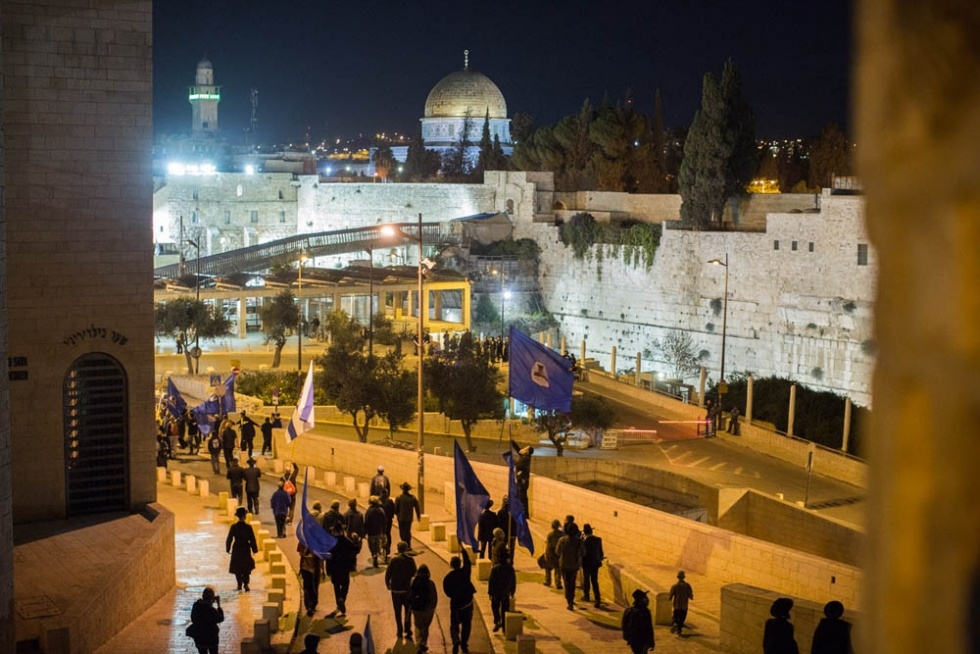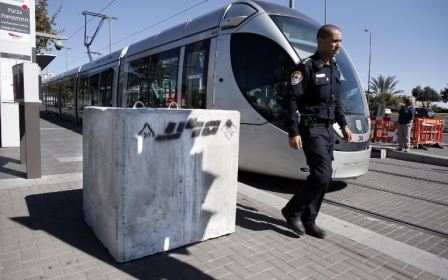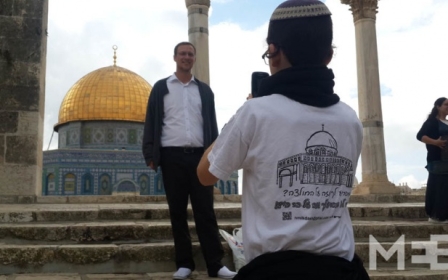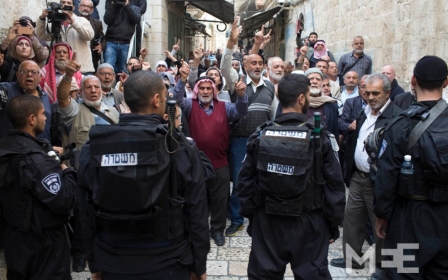Calls for 'day of rage' in Jerusalem as tensions, car attack death toll rise

Protest marches are expected to be held in Jerusalem today after two groups on Thursday called on Palestinians to take to the streets "in solidarity with al-Aqsa Mosque" following Friday prayers.
Hamas and Islamic Jihad reportedly issued separate statements late Thursday calling for the protests. Hamas urged Palestinians, particularly young people, to turn Friday into a "special day in the history of the Palestinian struggle to preserve our rights in Jerusalem" and "move to save the Aqsa Mosque and defend Jerusalem against the Israeli siege imposed on the city," according to news reports.
News also emerged late Thursday that a second pedestrian hit in a Wednesday car attack near a tramline in the city - 17-year-old Shalom Aharon Baadani - has died. A 38-year-old Israeli border police officer, Jidan Assad, died soon after Ibrahim al-Akri, also 38, drove a van into the group of people waiting for a bus in Jerusalem's Sheikh Jarrah neighbourhood. As Akri tried to flee the scene, Israeli police shot and killed him.
The car attack came hours after a clash between Palestinian worshippers and Israeli police in and around the al-Aqsa Mosque complex as a group of right-wing Israeli activists came to mark the passing of a week after the attempted assassination of Yehuda Glick, a right-wing activist who has long pushed for Jewish access to the site.
The al-Aqsa compound, which the Jewish community call Temple Mount, has been at the heart of rising tensions in the city in the week. Held sacred by both Jews and Muslims, access for Muslims to al-Aqsa is regularly limited to women and men over the age of 40 or 50, particularly during times of political tensions. On regular weekdays, tourists and Jews can enter the compound between 7:30AM and 10AM and for another hour at noon, but are escorted by police and are not allowed to pray or perform any religious ceremonies.
A rally to the Western Wall
On Thursday night, Glick and al-Aqsa again became a rallying focal point as a group of Jewish Israelis congregated for a rally at the Menachem Begin Heritage Centre, the site of Glick's assassination attempt, for a rally that proceeded through to the Western Wall at the heart of the Old City.
At 530pm, a group of around 50 protesters, carrying flags bearing a picture of the temple, met for prayers and speeches that called both for the swift recovery of Glick and access, prayer rights and full Jewish control over the al-Aqsa complex. The area is regarded as Judaism’s holiest site, although many in Israel believe it is forbidden for Jews to visit it.
Those that demanded access on Thursday represent a fringe group in Israeli society, but a vocal and determined collective nevertheless: on their route through Jerusalem, which curled from West Jerusalem behind the ancient walls and into the old city, they played music, sang and danced, ending their procession at the entrance to the Western Wall, where Arutz Sheva reported that they were prevented from entering.
“I came here today because the land of Israel belongs to the Jewish people, and we will never leave,” Haya Mandelcorn, a 56-year-old who lives in the Etzion settlement bloc, told Middle East Eye. “Even after 2000 years of terrible persecution, we won’t leave. We’re here because God gave Israel to our father, Abraham, and our mother, Sarah. He gave this land to us in order to observe here the bible that he gave to us, to be a blessing to people of the whole world.”
Despite recent car attacks in Jerusalem and the West Bank, which have killed three pedestrians and two Palestinian drivers in the last fortnight, protesters said they were not afraid. A constant police presence followed the route of the procession, which passed along one of Jerusalem’s main roads.
The men behind the march, well-known firebrands in the drive for Israeli advances on the al-Aqsa complex, were all in attendance: Aryeh King, the provocative Jerusalem City Council member; the former Knesset Member Michael Ben-Aril. The co-founder of the nationalism Otzma LeYisrael party, was also a leader in the crowd.
“We want to go back home,” Ben-Ari said in a speech to the assembled crowd. “People talk about terror attacks, but the biggest terror attack is the people who came into our home and built illegally, who told us that our home is not our home.
“We are just asking the most basic thing: the right of return,” he said, to cheers from the group.
'A war for this country'
A seasoned and provocative speaker, Ben-Ari riled the crowd with an anecdote that condemned Jewish employment of Arabs in explicitly racist terms. When he tried to buy food in a falafel shop, he said, the man behind the counter was a “terrorist”; in a nearby pizza shop, the Arab employee was the same. Ben-Ari boasted of refusing to give his money to the establishments, and indicated that he counted all Palestinians under this inflammatory banner. “There’s no coexistence with people who want to kill you,” Ben-Ari said. “This is not an intifada; it’s a war for this country.”
For both the speakers and those present, Netanyahu was held responsible for the problems in Jerusalem. The prime minister's refusal to give its explicit support to a change to the status quo at al-Aqsa has infuriated this minority, and many called for the resignation of those in power: while those present at Thursday’s protest would be considered politically extreme, frustration with the perceived weakness of the Israeli government’s response to recent events has been echoed across Jerusalem's religious communities.
Yehiel Yisrael, a psychiatrist born in California in 1947, was not involved in organising the march, but said he had called several friends to attend. Opposition to a leadership that was “not god-fearing”, and support for Yehuda Glick, compelled him to attend the demonstration, he said; so too did hope for the building of a Jewish temple on the site where the al-Aqsa compound now stands.
“We’re not going to attack any of the Muslim buildings, but maybe God will do that for us,” he told MEE. “They like to kill each other and we like to heal them, so maybe one of the Hamas rockets will destroy it, or an earthquake or something.
“Oslo is the worst thing that the Jewish leadership has done for thousands of years. Appeasement of your enemies out of political correctness or anything like this doesn’t work,” Yisrael continued, adding that all of those present considered Rabbi Meir Kahane, the ultranationalist leader of the Kach party, a political inspiration.
Outside the Western Wall, marchers set up a small protest where there procession ended, making speeches under the floodlights of the security barrier where small boys wearing Yehuda Glick masks scattered the crowds, surreal recurrences of the injured man’s cut-out face. Those present at Thursday's events represent a small and extreme, section of Israeli society. But the provocation of their moves toward the al-Aqsa compound, and the force it may yet exert on decision-makers in Israeli government, still weighs heavily on the minds of those in this uneasy city.
PHOTOS BY OREN ZIV
Middle East Eye propose une couverture et une analyse indépendantes et incomparables du Moyen-Orient, de l’Afrique du Nord et d’autres régions du monde. Pour en savoir plus sur la reprise de ce contenu et les frais qui s’appliquent, veuillez remplir ce formulaire [en anglais]. Pour en savoir plus sur MEE, cliquez ici [en anglais].




